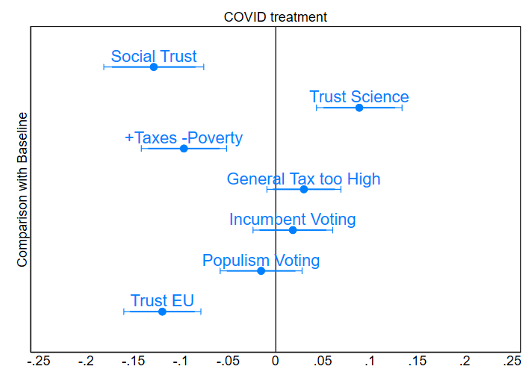Has Covid killed-off populism? That would seem to be a reasonable assumption. In a pandemic we don’t want change, we just want things to get back to normal. Thus we can expect voter appetites to swing away from disruption and back to competence.
Well, that’s the theory, but is there any hard evidence to back it up? The picture we see so far from opinion polls (and actual elections) is mixed — and besides they don’t directly measure the impact of Covid on political attitudes.
Which is why a recent study by a team lead by Gianmarco Daniele of the University of Milan is so valuable. The findings are summarised in an article for VoxEU — and while they provide some comfort for the establishment, they come with clear warning signs that shouldn’t be ignored.
The research took the form of a survey (conducted in Italy, Spain, Germany and the Netherlands) to assess levels of trust in various institutions and support for various policies. Some of the respondents were first asked some warm-up questions to get them thinking about the Covid crisis; the rest formed a baseline group who were not primed in this way.

The differences between the two groups suggest that having Covid on our minds does indeed change our political preferences. For instance, compared to the baseline, we see higher levels of support for incumbent parties and correspondingly lower levels for populist parties. However, some of the other effects were much bigger; for instance the decline of trust in the European Union (and the increase of trust in science).
One of the most significant trends was the decrease in social or “interpersonal” trust. Obviously we fear our fellow citizens on the grounds that they might infect us, but there’s probably more to it than that — for example, the survey also found a decrease in support for redistributive welfare policies.
It should be said that the survey was taken during the first wave of the pandemic. However, the study does provide a hint about what the longer-term impact on politics might be. When Professor Daniele and his team primed survey respondents with Covid questions that focused on the economic consequences of the crisis, they found that support for governing parties fell back (though not to the benefit of populist parties). At the same time, people were more likely to say that tax levels were too high.
On this evidence, post-Covid politics is unlikely to be either populist or progressive. For a while at least, the demand will be for strong national governments with the authority to hold their battered, distrustful societies together. Generosity — especially to others — will not be at a premium. There’s no reason why mainstream politicians can’t cater to this defensive, small-c conservative mood; but, if they don’t, there are others who will.








Join the discussion
Join like minded readers that support our journalism by becoming a paid subscriber
To join the discussion in the comments, become a paid subscriber.
Join like minded readers that support our journalism, read unlimited articles and enjoy other subscriber-only benefits.
Subscribe